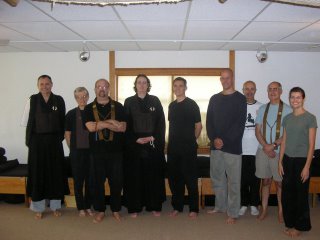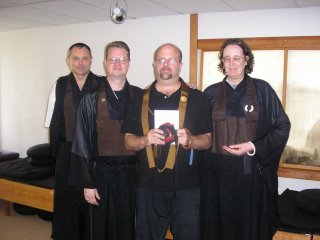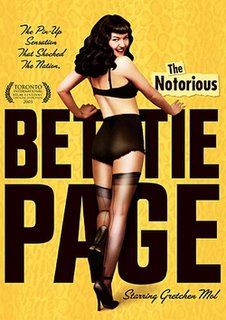
It would be entertaining though not incredibly challenging to play "six degrees of Kevin Bacon" on these two movies; fortuitously I watched the bonus disc to
Punk: Attitude the night after
The Notorious Bettie Page, which helped me figure out what was disturbing me about the latter.
Both of these movies are highly recommended.
Bettie Page is if nothing else a masterpiece of cinematography; filmmaker Mary Harron has done a great job of bringing an indealized version of the fifties into the viewer's space -- idealized not in a "Leave It to Beaver" or
Back to the Future sense, but as actually remembered by those of us with a marginal temporal connection to the time. For me, it's the late forties and fifties as seen in my parent's photographs of their early married days, or in the beach movie or romantic comedies of the late fifties and early sixties. Most of the film is black and white, with occasional very stylized uses of color; for the most part, Nashville and New York are black and white, but we burst into a modern incarnation of technicolor whenever Bettie goes to Miami. This is one of the best examples I've seen of a filmmaker taking you visually into that period.
If anyone doesn't know,
The Notorious Bettie Page is the story of a little Christian girl from Nashville who goes to New York to study acting and becomes the pinup queen of the late forties and early fifties. Under the aegis of Irving Claw, the aspiring actress is led further into the underbelly of what passed at the time as borderline porn, the bondage and submission industry. Who hasn't seen Bettie trussed up with a ball gag or in leather corsets and thigh-high black boots? She was the anti-Marilyn, the dark angel of the locker room. Her photos were sold under the counter at the newstand before the industry began to flower and loosen up right after
Playboy began publication in the mid-fifties. Shortly after the industry legitimized, Bettie's career was over; Irving Claw was dragged before a Senate subcommittee (by another famous Tennessean, ironically, the McCarthey-esque Estes Kefauver, who has an office building here named after him) for U.S. Postal violations and his livelihood curtailed. As depicted in the movie, after not having to testify, Bettie seems to have either an understanding of or a guilt trip over her deeds and career, and flees back into the arms of Jesus. Movie over.
Gretchen Moll's depiction of Bettie, regardless of its accuracy, is riveting. You can't take your eyes off her, even when she is clothed (which as you might guess is not for
all of the movie). As directed by filmmaker Harron, Bettie is a small-town girl and innocent nudist who is able to doublethink herself into ignoring the darker side of her industry. Let me caution you that the movie is based in part on a book I haven't read, so I don't know how historically or personally accurate the Harron/Moll depiction of Bettie is. The movie Bettie is not so much naive as accepting. At some point I think she realizes the fans of her artistic output are not as pure as she pretends, yet she accepts her role. Much of the mystique of Bettie Page over the years has been that even at her S&M darkest, she retains a look of fun; she never seems to think she is doing anything dirty -- more the naughty girl. However, the short film of the real Bettie stripping included in the bonus materials gives me a slightly different read on her face -- one more conducive with the film's rather banal allusion to possible childhood molestation. Unlike Gretchen Moll's Bettie, the real Bettie has a look on her face I've seen on people in similar roles in the real world.
The puzzling thing about this movie immediately after I watched it was the sense of something lacking -- something that appears in the face of the real Bettie. It is a very literal retelling of her life, literal not in the sense of being accurate, but of being very much an outside shot of its protagonist. Could Bettie really have been that unaware of her social impact and the archetype she helped create? Mary Harron certainly isn't, so it's up to the viewer to figure out why the movie was made this way. The missing link was made more missing for me last night when I watched the second disc of
Punk: Attitude. Don Letts' film is the best documentary I've seen yet on punk. Normally, this kind of mass cultural overview disappoints me, so I was reluctant to watch the film, but Letts has done a great job.

 Punk: Attitude
Punk: Attitude chronciles the history of punk from its arising from early rock and roll through the darker side of the sixties, through its inception through seminal bands like the Velvet Underground and the MC5, its natal period during the glam and glitter rock periods of the early seventies, and then its birth in 1975. Foreshadowed by the New York Dolls, my favorite rock and roll band of all time, punk found full expression in the Ramones, the Clash and the Sex Pistols, then after the Pistols' demise went underground into hardcore, and in my opinion, died. The fimmaker makes a case for punk's re-emergence in the Seattle scene in 1991, but I have my own prejudices against that era's icons like Kurt Cobain, perhaps the most overrated dead pop star of all time. Nevertheless, no one who lived through the punk scene of the late seventies and very early eighties can fail to be delighted by the film, and for the rest of you, it's a great history lesson. The film makes points with me by realizing the glam rock connection, including mention of obscure bands like Mott the Hoople along with the obvious like Iggy and the Stooges (but what about T. Rex? what about Slade? What about Wendy O. Williams and the Plasmatics? but I'm nit-picking).
The connection to all this is, watching the bonus interviews for
Punk: Attitude last night, who appears, being interviewed along with Legs McNeill about the founding of
Punk magazine (the apparent source of the genre sobriquet), but Mary Harron? So the filmmaker who portrays the relatively innocent Bettie was right there at the inception of the punk rock movement at CBGB's. Not being the most sophisticated film fan, I had to go online to learn that Harron was also responsible for
I Shot Andy Warhol (a murky film featuring good acting by
Bettie Page supporting actress Lily Taylor) and a very good film,
American Psycho. I've always that although
American Psycho was a very good film, it's nowhere as good as the novel by Brett Easton Ellis, because in the book you're never sure if all this killing is really going on. So in a sense, the film shares with
Bettie Page the characterist of over-literal-ness.
One of the elements of the punk rock movement which has survived into the modern mainstream is the incorporation of leather and bondage gear. What began to emerge into the mainstream with Bettie came into the youth movement with the punk movement of which Mary Harron was apparently very much a part, then came to the forefront with Madonna, etc, and is now an element of the youth market. The children of the Senators who hounded Irving Claw out of business are now buying Bettie-style gear for
their children.
Punk: Attitude is as an intelligent an interpretation of punk as could be tolerated, and in fact some of the interviews with punk icons like Paul Simenon of the Clash and the Buzzcocks, let along Henry Rollins, start to go over the top, especially when they discuss their literary influences; despite the validity of influences like William Burroughs, Graham Greene, etc., you have to wonder how many of these "influences" were picked up by the speakers
post hoc in their increased free time since their punk careers ended.
The Notorious Bettie Page is not quite as intelligent but is very watchable, though hollow in an odd way, sort of in the same way
Good Night and Good Luck is hollow; there's something more here, some sort of missing ghost in the shell. Perhaps that emptiness is that true import of these pieces in tandem.

 By the way, the best pop Christmas music of all time is probably Jethro Tull's Songs from the Wood album; click this link for a video. The best of course is all that great classical music written for this occasion. Talk to ya before then!
By the way, the best pop Christmas music of all time is probably Jethro Tull's Songs from the Wood album; click this link for a video. The best of course is all that great classical music written for this occasion. Talk to ya before then!


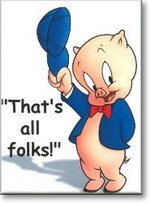

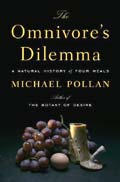
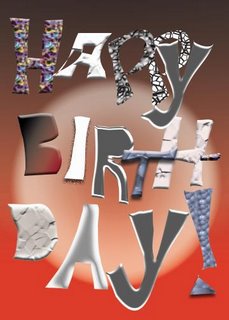

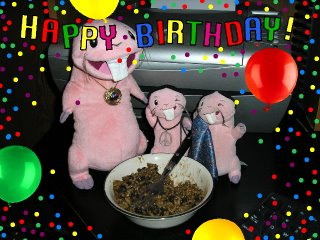


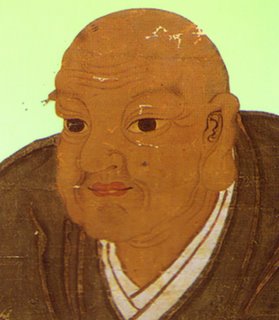
 This whole Pluto thing has been cracking me up for weeks now, but it's been bugging me, too, and I finally figured out why.
This whole Pluto thing has been cracking me up for weeks now, but it's been bugging me, too, and I finally figured out why.